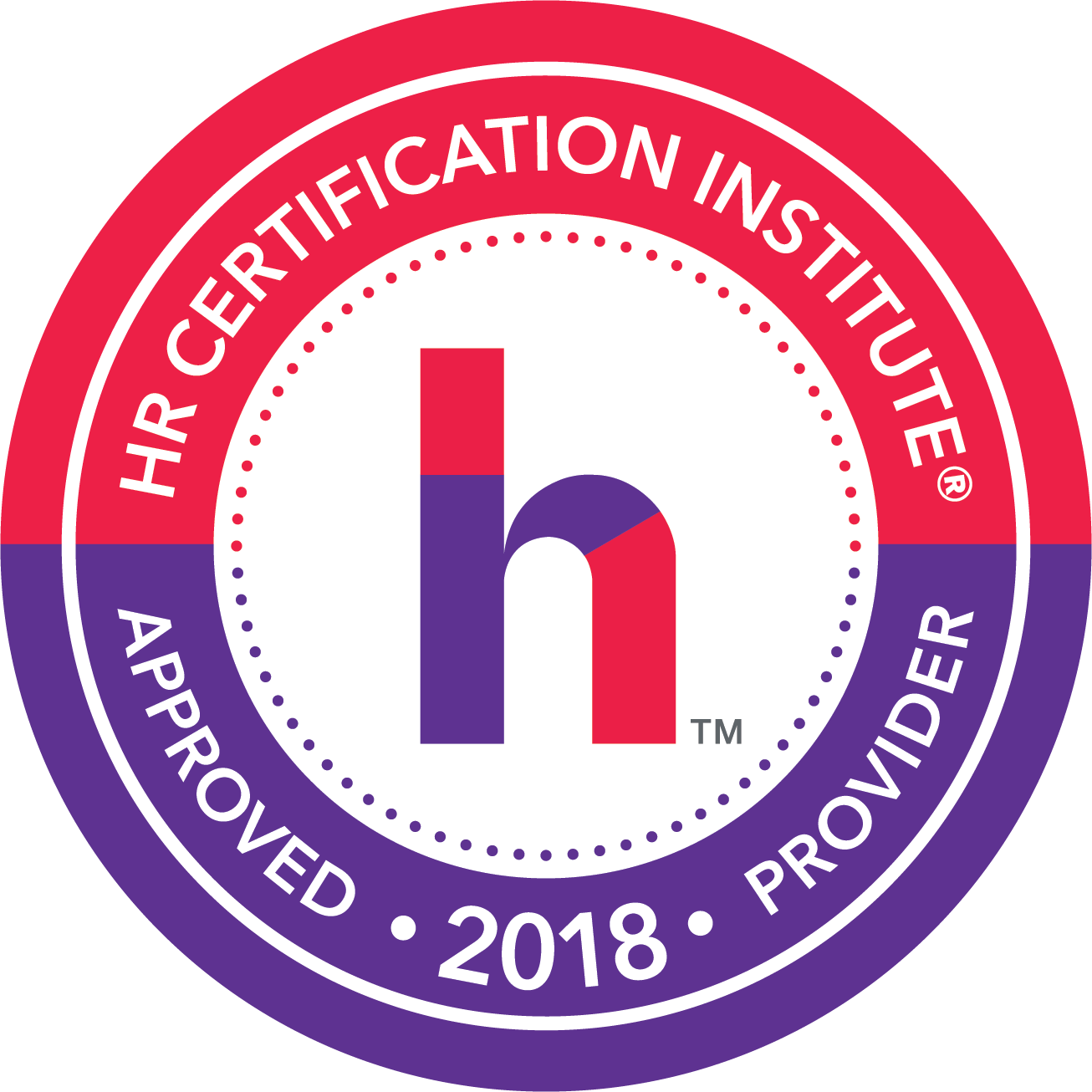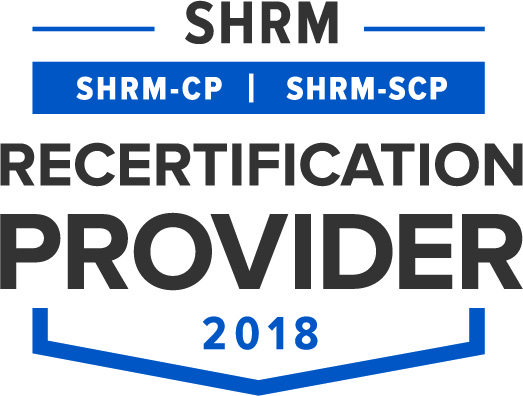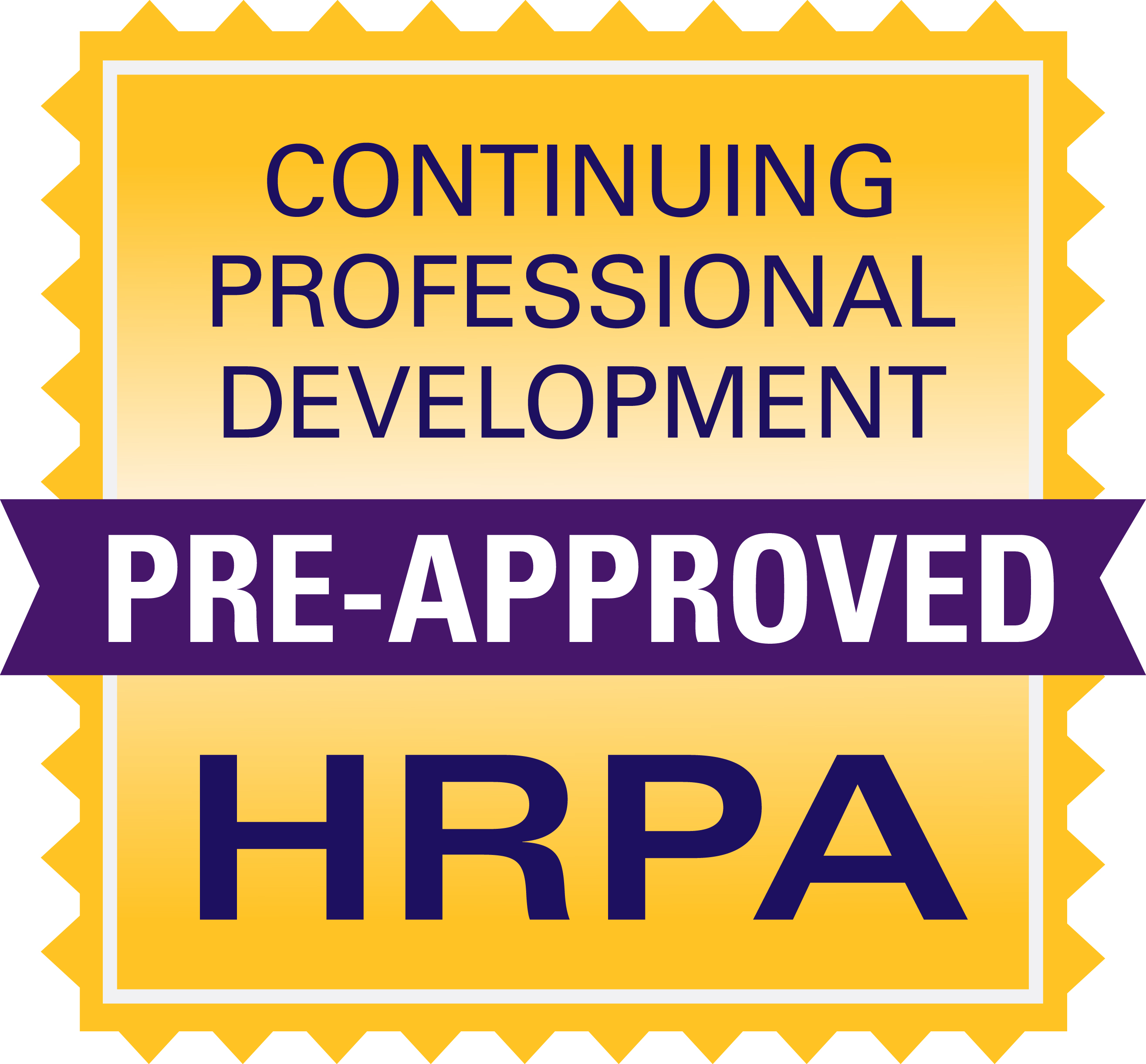Mastering Workplace Dynamics

Mastering Workplace Dynamics will provide you with the knowledge and tools you will need to be effective in assisting your clients when they experience conflict. We will introduce you to the most critical aspects of understanding and assessing conflict situations in the workplace – conflict zones, conflict escalation, and conflict management styles.

The use of this seal confirms that this activity has met HR Certification Institute’s® (HRCI®) criteria for recertification credit pre-approval.

This program is valid for 20 PDCs for the SHRM-CPSM or SHRM-SCPSM.

This program has been approved for 20 CPD hours under Section A of the Continuing Professional Development (CPD) Log of the Human Resource Professionals Association (HRPA).
About Our Course

One of the key tools that we have developed for exploring individual conflict manage styles is the Workplace Conflict Styles Indicator (WCSI). We have used this personal assessment tool with thousands of individuals. They have attested consistently to the power of this tool in helping them deal with conflict in the workplace. In this program, you will become certified in the administration and interpretation of the WCSI so that you can bring this incredible tool to your clients.
While this is an online program that allows you to access the modules at your convenience and at your own pace, it also gives you an opportunity to interact, in real time, with us to ensure that your specific questions are addressed and that you can immediately apply the tools and techniques provided in this program.
Explore Our Program

We want to accelerate your expertise in addressing conflict in the workplace. This program is designed to give you the knowledge and the support you need to be a masterful conflict management practitioner. Join us for this dynamic and interactive learning experience.
- Understand what workplace conflict is, how we can break its negative cycle and how to turn it into a positive cycle where we get the results that we want
- Identify the various types of workplace conflict and levels of escalation
- Identify the appropriate types of intervention and proper de-escalation techniques for workplace conflict
- How to use, administer, apply and interpret the Workplace Conflict Styles Indicator (WCSI) tool for clients
- Identify the 5 conflict management styles in the workplace and how to best manage interactions between the various styles
- How to empower clients to understand their conflict management style and the role that choice plays in achieving effective results
Conflict Cycle
- Live Session Prep (35 min)
- Live Session (90 min)
- Self-Directed Learning Activities: ~30 min
- Learn about the conflict cycle and how negative perceptions can impacts behaviour in conflict situations
- Develop understanding of how the conflict cycle can impact your work with clients in the workplace
What do we mean by conflict? What happens when someone in the workplace doesn’t like dealing with conflict? In this highly interactive session, you will learn, what workplace conflict is, how we can break its negative cycle and how to turn it into a positive cycle where we get the results that we want. We will discuss each of the conflict cycle stages in depth so that you can guide clients in how to identify opportunities for positive change.
Conflict Zones
- Live Session (60 min)
- Self Directed Learning Activities: ~120 min
- Learn about the various zones of conflict found in the workplace
- Understand the importance of appropriate interventions for each conflict zone
Ever feel lost in a conflict that is complex and confusing? Don’t leave yourself guessing. Module 2 will give you all the tools that you need to determine what exactly you are dealing with and what your next steps may be.
The first step to addressing workplace conflict is to understand what type of conflict you are dealing with. In Module 2 we will take a look at what we call “conflict zones” and how they manifest. We will teach you how to assess a conflict situation and determine the best approach for resolution in each of the zones.
Escalation
- Live Session (90min)
- Self Directed Learning Activities: ~60 min
- Acquire an in-depth understanding of the four stages of conflict escalation
- Identify opportunities for resolution and what types of interventions are most appropriate and why
You know a conflict is escalating at work when things start to get tense, but it isn’t always easy to determine how it got there and what the exact level of escalation it has reached. There is a pattern to escalation, and learning about this pattern and how it works can disarm the power conflict has in our lives and make it less daunting to deal with.
In module 3, you will learn the four levels of escalation, how to determine opportunities for resolution, and what the most appropriate intervention may be to prevent further escalation. Through various exercises, we will teach you what you need to know to determine when a conflict is past the point of just “talking it out”. Don’t waste your time and money trying to solve problems in one way, when they could easily be resolved in another.
Conflict Styles
- Live Session (60 min)
- Self Directed Learning Activities: ~90 min
- Learn how to use the Workplace Conflict Styles Indicator (WCSI) assessment tool
- Practice how to interpret WCSI results for yourself and others
- Understand the motivations, tactics and challenges of the 5 conflict management styles
At the heart of workplace conflict, are the people that are involved in conflict and their behaviour. How people act in conflict is what we call their conflict management style. Each of the 5 conflict management style can either help escalate a situation or move towards a resolution. Understanding this is and knowing when to use each style is critical to move towards more effective conflict management skills. We found this aspect of team dynamics so important that we developed the Workplace Conflict Styles Indicator (WCSI) tool to effectively assess a client’s conflict management style in a team environment.
As a part of the module, you will determine your own conflict management style by taking the WCSI and learn how to use and apply the tool with clients. After certification, you will be qualified to administer the WCSI as a tool with clients as a way to help coach and train others to manage their conflict management style in the most effective way. We will teach you how to help clients identify the strengths and weaknesses of their team and how to deal with potential negative reactions to contents from clients. In this module, you will learn that there’s another way to respond to conflict so that we can better assist clients in setting them up for success.
Interactions
- Live Session (75 min)
- Self Directed Learning Activities: ~75 min
- Understand how the 5 conflict management styles interact
- Learn how to deal with other styles and how to best position clients for successful resolution
Everyone has their own style that interacts with another. Understanding these dynamics and where there is opportunity to resolve the situation is key to strengthening team dynamics. In this module, we use an accessible metaphor describing the 5 styles as birds, which makes the WCSI tool a fun and easy tool to teach to clients. In this module, we will take an in depth look at the motivations, characteristics, strengths and challenges of each of the styles. We will provide you with the tools that you need to learn how to deal with each style and how to lead teams from a place of strength. It is our goal for you to walk away from this module feeling more confident and prepared to encounter clients of various conflict management styles.
Flight Patterns
- Live Session (60 min)
- Self Directed Learning Activities: ~90 min
- Identify, trace and manage flight patterns based on the WCSI assessment results
- Have a concrete understanding of what can happen when our tactics to conflict are not working
Conflict isn’t static and neither are the people involved. We can often try different tactics, which are not always intentional, and these tactics can either help or hinder us. Flight patterns are what happens when a someone changes their conflict management approach because their tactics are no longer working to resolve the conflict. In this module, we will cover the shift in tactics used by the 5 conflict management styles when their preferred strategy isn’t working and discuss the pacing, motivation, and implications behind each “flight”. You will learn how to map out a client’s flight pattern by using their results of the WCSI and how to deal with stale mate dynamics.
Practice
- Live Session (90 min)
- Self Directed Learning Activities: ~60 min
- Strengthen your ability to work with individuals and groups experiencing conflict
- Apply the collective learning in this program to confidently navigate through a real-life case study
Identifying conflict zones, assessing conflict escalation and recognizing conflict management styles will equip you with the knowledge required to successfully work with and address conflict situations in the workplace. This module culminates in an extensive case study that will enable you to apply the knowledge and skills you have acquired.
- Live Session (150 min)
- Gather tips, advice and best practices for providing conflict management services
- Discover how to communicate and market your skills to clients in a variety of contexts
In our 20+ years of experience helping organizations prevent, manage and resolve workplace conflict we have learned a lot about how to work with individuals, teams, groups and organizations. In this final module, we will share our lessons learned and best practices around such topics as the ROI of conflict management, dealing with conflict-adverse leaders and organizations, how to take the first steps in addressing long-standing conflicts in the workplace and other topics that will be of value to you as you develop your own practice as a conflict management practitioner.
BONUS Q&A session
Still have questions? Are you dealing with specific situations you would like help with? In this special bonus session, we will answer your questions and provide expert advice and guidance to ensure that you are prepared to deal with workplace conflict situations with skill and confidence.
Testimonials


